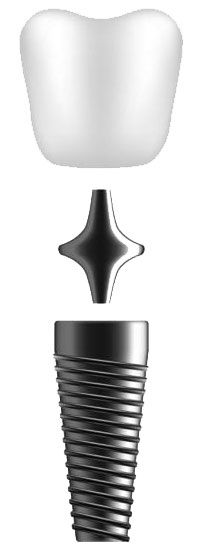You know that you are unhappy with your smile, but does that mean you should get dental implants? With so many different options available for restoring damaged, decayed, or missing teeth, it can be hard to determine if dental implants are the best option for you. And since you are putting your time and money into getting dental implants, you definitely want to feel confident in your decision.
For starters, it is important to know what dental implants are and how they are placed. Dental implants are artificial tooth roots that are surgically implanted into the jawbone. Once the implant has healed and fused with the surrounding bone, it acts as an anchor to support a dental prosthetic such as a crown, bridge, or denture. Dental implant surgery has a high success rate and restores your smile with dental implants that look and function like natural teeth.
Even with knowing the key benefits of dental implants, you may still be wondering when YOU should consider having dental implants placed. While only you can decide for sure that dental implants are the right choice for restoring your smile, it is important to consider some of the many reasons why thousands of other individuals have elected to have dental implants placed for themselves. Here are some perspectives on when you should consider dental implants:
When you can no longer wear dentures.
Are you tired of your dentures slipping or falling out when you talk or eat? Have they begun to not fit properly and are rubbing uncomfortably on your gums? If so, you may be able to trade in your traditional dentures for an implant-supported denture that will fit without slipping or falling out of the mouth.
Your Jawbone has begun to deteriorate.
Unfortunately, after one or more teeth is lost the body initiates a process called bone resorption. During this process, the body essentially absorbs bone from the jawbone and redistributes it to other areas of the body. The result is a jawbone that slowly deteriorates over time and changes shape. In some cases, dental implants can be used to stimulate the jawbone so that the bone mass is preserved. However when the jawbone has deteriorated, a bone graft may need to be performed in order to place dental implants.

When you have severe tooth decay.
There are many different ways to restore a decayed tooth such as fillings, inlays, onlays, root canals, and dental crowns. However, these options may not work for teeth that are severely decayed. In cases where one or more teeth is unable to be restored, your dentist will usually recommend extracting the tooth. You may even be able to have your tooth extracted and a dental implant placed during the same procedure. However, there are also cases where the extraction site must heal before a dental implant can be placed.
After a dental trauma or extraction.
Whether you have lost a tooth to dental trauma or because of extraction, dental implants can be used to replace that tooth. Unlike a fixed dental bridge, dental implants preserve the health of your jawbone while also restoring one or more missing teeth. Not only that, but dental implants are more comfortable than fixed bridgework. Generally speaking, you will want to replace a missing tooth as soon as possible to minimize bone loss in the jaw.

